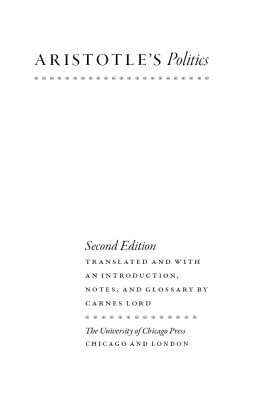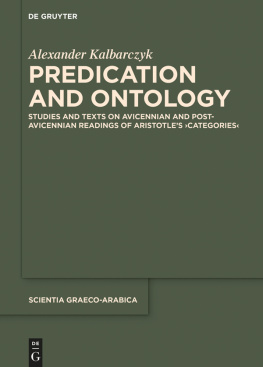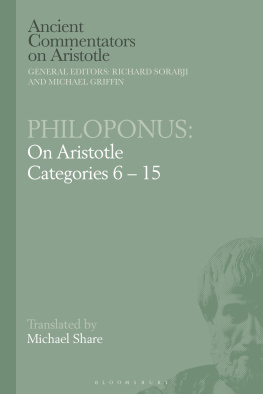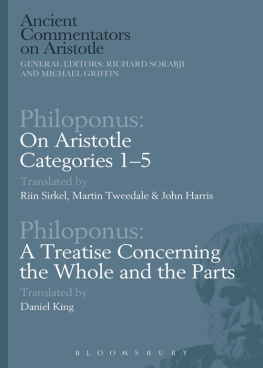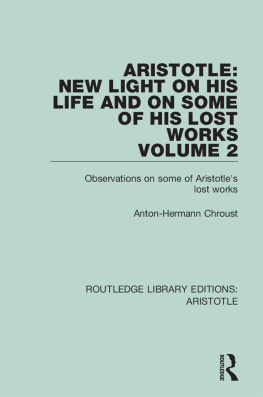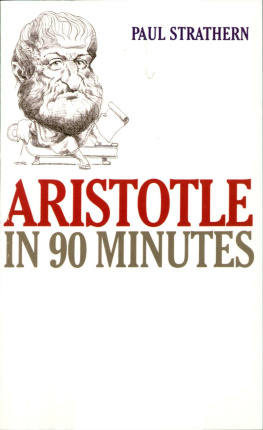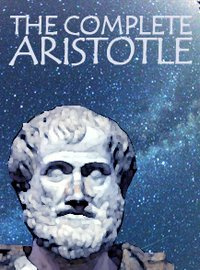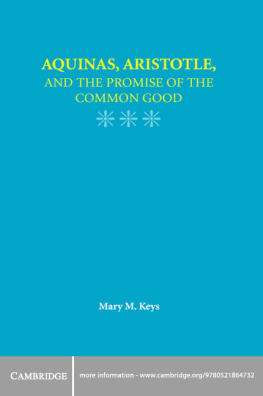Aristotle - Categories
Here you can read online Aristotle - Categories full text of the book (entire story) in english for free. Download pdf and epub, get meaning, cover and reviews about this ebook. genre: Science. Description of the work, (preface) as well as reviews are available. Best literature library LitArk.com created for fans of good reading and offers a wide selection of genres:
Romance novel
Science fiction
Adventure
Detective
Science
History
Home and family
Prose
Art
Politics
Computer
Non-fiction
Religion
Business
Children
Humor
Choose a favorite category and find really read worthwhile books. Enjoy immersion in the world of imagination, feel the emotions of the characters or learn something new for yourself, make an fascinating discovery.
Categories: summary, description and annotation
We offer to read an annotation, description, summary or preface (depends on what the author of the book "Categories" wrote himself). If you haven't found the necessary information about the book — write in the comments, we will try to find it.
Categories — read online for free the complete book (whole text) full work
Below is the text of the book, divided by pages. System saving the place of the last page read, allows you to conveniently read the book "Categories" online for free, without having to search again every time where you left off. Put a bookmark, and you can go to the page where you finished reading at any time.
Font size:
Interval:
Bookmark:
The Project Gutenberg EBook of The Categories, by Aristotle
This eBook is for the use of anyone anywhere at no cost and with
almost no restrictions whatsoever. You may copy it, give it away or
re-use it under the terms of the Project Gutenberg License included
with this eBook or online at www.gutenberg.net
Title: The Categories
Author: Aristotle
Translator: E. M. Edghill
Posting Date: October 23, 2008 [EBook #2412]
Release Date: November, 2000
Language: English
*** START OF THIS PROJECT GUTENBERG EBOOK THE CATEGORIES ***
Produced by Glyn Hughes. HTML version by Al Haines.
Part 1
Part 2
Part 3
Part 4
Part 5
Part 6
Section 2
Part 7
Part 8
Section 3
Part 9
Part 10
Part 11
Part 12
Part 13
Part 14
Part 15
Things are said to be named 'equivocally' when, though they have a common name, the definition corresponding with the name differs for each. Thus, a real man and a figure in a picture can both lay claim to the name 'animal'; yet these are equivocally so named, for, though they have a common name, the definition corresponding with the name differs for each. For should any one define in what sense each is an animal, his definition in the one case will be appropriate to that case only.
On the other hand, things are said to be named 'univocally' which have both the name and the definition answering to the name in common. A man and an ox are both 'animal', and these are univocally so named, inasmuch as not only the name, but also the definition, is the same in both cases: for if a man should state in what sense each is an animal, the statement in the one case would be identical with that in the other.
Things are said to be named 'derivatively', which derive their name from some other name, but differ from it in termination. Thus the grammarian derives his name from the word 'grammar', and the courageous man from the word 'courage'.
Forms of speech are either simple or composite. Examples of the latter are such expressions as 'the man runs', 'the man wins'; of the former 'man', 'ox', 'runs', 'wins'.
Of things themselves some are predicable of a subject, and are never present in a subject. Thus 'man' is predicable of the individual man, and is never present in a subject.
By being 'present in a subject' I do not mean present as parts are present in a whole, but being incapable of existence apart from the said subject.
Some things, again, are present in a subject, but are never predicable of a subject. For instance, a certain point of grammatical knowledge is present in the mind, but is not predicable of any subject; or again, a certain whiteness may be present in the body (for colour requires a material basis), yet it is never predicable of anything.
Other things, again, are both predicable of a subject and present in a subject. Thus while knowledge is present in the human mind, it is predicable of grammar.
There is, lastly, a class of things which are neither present in a subject nor predicable of a subject, such as the individual man or the individual horse. But, to speak more generally, that which is individual and has the character of a unit is never predicable of a subject. Yet in some cases there is nothing to prevent such being present in a subject. Thus a certain point of grammatical knowledge is present in a subject.
When one thing is predicated of another, all that which is predicable of the predicate will be predicable also of the subject. Thus, 'man' is predicated of the individual man; but 'animal' is predicated of 'man'; it will, therefore, be predicable of the individual man also: for the individual man is both 'man' and 'animal'.
If genera are different and co-ordinate, their differentiae are themselves different in kind. Take as an instance the genus 'animal' and the genus 'knowledge'. 'With feet', 'two-footed', 'winged', 'aquatic', are differentiae of 'animal'; the species of knowledge are not distinguished by the same differentiae. One species of knowledge does not differ from another in being 'two-footed'.
But where one genus is subordinate to another, there is nothing to prevent their having the same differentiae: for the greater class is predicated of the lesser, so that all the differentiae of the predicate will be differentiae also of the subject.
Expressions which are in no way composite signify substance, quantity, quality, relation, place, time, position, state, action, or affection. To sketch my meaning roughly, examples of substance are 'man' or 'the horse', of quantity, such terms as 'two cubits long' or 'three cubits long', of quality, such attributes as 'white', 'grammatical'. 'Double', 'half', 'greater', fall under the category of relation; 'in a the market place', 'in the Lyceum', under that of place; 'yesterday', 'last year', under that of time. 'Lying', 'sitting', are terms indicating position, 'shod', 'armed', state; 'to lance', 'to cauterize', action; 'to be lanced', 'to be cauterized', affection.
No one of these terms, in and by itself, involves an affirmation; it is by the combination of such terms that positive or negative statements arise. For every assertion must, as is admitted, be either true or false, whereas expressions which are not in any way composite such as 'man', 'white', 'runs', 'wins', cannot be either true or false.
Substance, in the truest and primary and most definite sense of the word, is that which is neither predicable of a subject nor present in a subject; for instance, the individual man or horse. But in a secondary sense those things are called substances within which, as species, the primary substances are included; also those which, as genera, include the species. For instance, the individual man is included in the species 'man', and the genus to which the species belongs is 'animal'; these, therefore-that is to say, the species 'man' and the genus 'animal,-are termed secondary substances.
It is plain from what has been said that both the name and the definition of the predicate must be predicable of the subject. For instance, 'man' is predicted of the individual man. Now in this case the name of the species man' is applied to the individual, for we use the term 'man' in describing the individual; and the definition of 'man' will also be predicated of the individual man, for the individual man is both man and animal. Thus, both the name and the definition of the species are predicable of the individual.
With regard, on the other hand, to those things which are present in a subject, it is generally the case that neither their name nor their definition is predicable of that in which they are present. Though, however, the definition is never predicable, there is nothing in certain cases to prevent the name being used. For instance, 'white' being present in a body is predicated of that in which it is present, for a body is called white: the definition, however, of the colour white' is never predicable of the body.
Everything except primary substances is either predicable of a primary substance or present in a primary substance. This becomes evident by reference to particular instances which occur. 'Animal' is predicated of the species 'man', therefore of the individual man, for if there were no individual man of whom it could be predicated, it could not be predicated of the species 'man' at all. Again, colour is present in body, therefore in individual bodies, for if there were no individual body in which it was present, it could not be present in body at all. Thus everything except primary substances is either predicated of primary substances, or is present in them, and if these last did not exist, it would be impossible for anything else to exist.
Font size:
Interval:
Bookmark:
Similar books «Categories»
Look at similar books to Categories. We have selected literature similar in name and meaning in the hope of providing readers with more options to find new, interesting, not yet read works.
Discussion, reviews of the book Categories and just readers' own opinions. Leave your comments, write what you think about the work, its meaning or the main characters. Specify what exactly you liked and what you didn't like, and why you think so.



